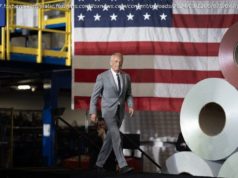Jim Cramer explains what makes Apple’s trillion dollar market cap so meaningful.
With the stock of Apple reaching a $1 trillion market cap on Thursday, CNBC’s Jim Cramer wanted to highlight the milestone’s importance for investors.
“Apple matters more than the Chinese saying that they won’t stand for President Trump’s tariff raise,” the ” Mad Money ” host said. “Apple matters more than whether the yield on the benchmark 10-year Treasury crosses 3 percent or not.”
To hammer his point home, Cramer found 10 reasons for why the $1 trillion level is so meaningful for the iPhone maker and the stock market .
But the most important one? He figured Apple wouldn’t be alone in the trillion-dollar club for long.
“You’re going to start seeing Microsoft and Amazon in the same club because of how well they’re doing,” he said. “And among these three tech titans, I have to tell you, there’s a ton of pin action.”
Find his full list of reasons here .
Investors have to be wary of companies that are facing cutthroat competition in their industries, Cramer said on Thursday.
“Competition may be the lifeblood of capitalism, but it is an anathema to making money,” he warned. “As an investor, you want to own companies with as little competition as possible.”
The most recognizable names in the stock market — names like Amazon and Apple, which reached $1 trillion in market value on Thursday — have been strong performers because their businesses “appear to be unassailable” by prospective rivals, Cramer said.
But when it comes to sectors rife with competition, owning stocks within them can be downright “treacherous,” he explained.
Here are the stocks and sectors he would avoid .
Plastics manufacturers have never been more united about the need to curb plastic waste than now, Dow Chemical Company CEO Jim Fitterling told CNBC on Thursday.
“Plastics are a great sustainability story. They’re the most sustainable package in the world and they’re the fastest-growing packaging in the world. We do have a plastic waste problem, though, and at this point in time, I’ve never seen the industry more aligned about tackling that problem,” Fitterling told Cramer in an interview.
Concrete data on plastic waste levels is difficult to track, but what we do know doesn’t look good. Scientists estimate that on the whole, global manufacturers have put out roughly 8.3 billion metric tons of new plastic. In 2015,6.3 billion metric tons of that had become plastic waste — and only 9 percent of that was recycled, a study said .
Fitterling, whose company is part of chemical conglomerate DowDuPont, said that industry leaders have been “working on a very big initiative” that will be rolled out over the next several months.
Watch and read more about his interview here .
In Starbucks’ fiscal third quarter, its China business — which has historically been a growth driver for the company — weakened slightly. While Starbucks’ revenues in the Chinese market grew 17 percent, its same-store sales, a key metric for retailers, fell 2 percent.
But “most of the growth of transactions in China is coming from our new store growth,” Starbucks CEO Kevin Johnson told Cramer on Wednesday.
“Now, yes, we did have a negative 2 percent same-store sales comp last quarter, but, you know, if… I look at what we’re doing here with Alibaba and the digital flywheel and enabling delivery, this is like rocket fuel for the digital flywheel in China,” he said.
The key to succeeding as a U. S.-based business in China? For Johnson, it’s all about embracing the culture.
“The approach that we’ve taken has been one of approaching the market with humility and respect for the Chinese culture and the Chinese consumer,” he told Cramer, adding that Starbucks’ research and development teams have tinkered with some of the company’s flavor profiles to better fit the Chinese consumer.
“We hire local contractors to build our stores. The store design team sits here in China,” the CEO said. “So by embracing the Chinese culture and approaching the market in the right way, you know, we believe that you can really have a very symbiotic relationship and grow a very health business like Starbucks in China by taking that approach.”
Watch and read more about Johnson’s interview here .
Clorox’s value-driven mission is being augmented by consumers’ flight to the internet, the bleach maker’s Chairman and CEO Benno Dorer told Cramer in a Thursday interview.
“Almost 60 percent of our advertising sales promotion dollars this fiscal year will be online, which is where the consumers are,” Dorer said.
But the issues looming around user privacy and data use, particularly with Facebook, aren’t dire enough to eat into Clorox’s advertising prowess.
“We have great confidence in our capabilities to engage consumers online, which is why we’re shifting the dollars increasingly into this space,” Dorer said. “Social media is only a very small part of our online spend, but what I will tell you is that Facebook is investing to create a safer environment for our brands and more transparency. So for companies like Clorox, in the long run, those are good things.”
To watch Dorer’s full interview and hear his take on raw-cost-related price increases, click here .
In Cramer’s lightning round, he shared his take on callers’ favorite stocks:
Zuora, Inc .: “Tien Tzuo is brilliant. He’s the CEO. When the stock got to [the] mid-$30s, we said ka-ching, ka-ching. Then we said it was going to go back down and that’s when we said you should buy it and you should be buying that stock right now and you should also be reading his book about the subscription economy. You’ll understand why we like Salesforce, you’ll understand why we like Apple’s service stream and you’ll understand why we like Zuora.”
Northrop Grumman Corp.: “Candidly, the quarter wasn’t that great.






